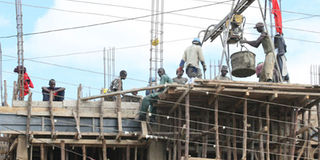How to estimate the cost of putting up a structure

Putting up a building, whether a commercial or residential one, calls for considerable investment in both capital and expertise, not to mention effort. PHOTO | FILE
What you need to know:
- To get a rough figure of the cost, take the price of the home, deduct the price of the land and divide that amount by the size of the house (measured in square feet).
- Mr Tairo says one can source the services from websites of institutions like the Architectural Association of Kenya and the Board of Registration for Architects and Quantity Surveyors.
- Other consultants that one might require, depending on the magnitude of the project, include a quantity surveyor, as well as a civil, structural and mechanical engineer.
Putting up a building, whether a commercial or residential one, calls for considerable investment in both capital and expertise, not to mention effort.
Perhaps you have some money saved up and would like to build a house or commercial property to rent out but are not sure where to start because you do not know whether the money will be enough because you don’t know how to estimate the amount you need.
To help understand how to estimate the cost of such a project, DN2 spoke to Martin Tairo, the managing director of Architect Kenya Ltd, a property consulting firm, about the basic guidelines.
Calculating building cost
“The amount it will cost to construct a building depends on a number of factors which, typically, include location, the type of house one is interested in, the finishing, fittings, quality of the building materials, site geography, among other things,” he said.
However, Mr Tairo, an architect, notes that the most basic factor that one should take into consideration is the size (area) of space to be built on.
“The easiest way that one can estimate how much their building will cost is by consulting someone who has recently built a similar house in the area. It is easy to find such a coincidence in housing projects since they are all similar in size, space provision and finishes,” he says.
To get a rough figure of the cost, take the price of the home, deduct the price of the land and divide that amount by the size of the house (measured in square feet).
According to Mr Tairo, it is advisable to use several recently built homes in the area that are similar to the one you wish to build to ensure that you get a fairly accurate estimate of the cost of construction.
“The point here is that if a house is selling for Sh2 million while the price of land it is built on is Sh1 million, then the construction cost will be approximately Sh1 million,” says Mr Tairo.
However, for other types of buildings whose designs differ from those in the vicinity, the Institute of Quantity Surveyors of Kenya has developed guidelines for the major towns by picking recently completed projects, measuring their sizes in square metres and establishing their actual construction costs.
Choosing an architect
“When choosing an architect, it is extremely important that you get along well. Chemistry is key, because you will spend a considerable amount of time together, not to mention sharing a lot of personal details (or corporate secrets) with them,” notes Mr Tairo.
Mr Tairo says one can source the services from websites of institutions like the Architectural Association of Kenya and the Board of Registration for Architects and Quantity Surveyors.
One can also ask their friends or colleagues for the contacts of architects they have worked with.
“The right time to bring an architect into the picture is when you are clear about what you want. If possible, interview several candidates. Review their professional credentials and ability to carry out your project,” he said.
Other consultants that one might require, depending on the magnitude of the project, include a quantity surveyor, as well as a civil, structural and mechanical engineer.
“And ensure that most of the project details are captured in some form of contract that clearly spells out the description of the job, total budget, architect’s consultancy fees and, if need be, scheduled completion date,” says Mr Tairo.
Is a contractor necessary?
While it might not be necessary to have a contractor for small projects, Mr Tairo says, it is important to have one person appointed to oversee the construction.
“A contractor will plan and coordinate all the activities relating to the construction of a building or structure. For projects where all funds are available, it is important that one get a qualified, registered building contractor to carry out the work,” he said.





